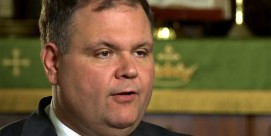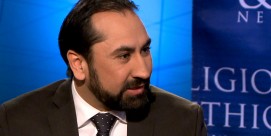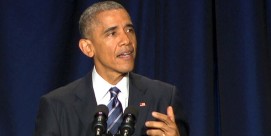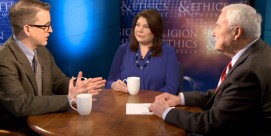Religious Realism and New Realities
by Robin W. Lovin
One important thing that religion brings to politics is a certain kind of realism about human nature and human possibilities.
In private life, we all exaggerate our own virtues and expect too much from our own plans. Faith helps us to keep our pride in check, and we can depend on friends and family to do it if our faith falls short.
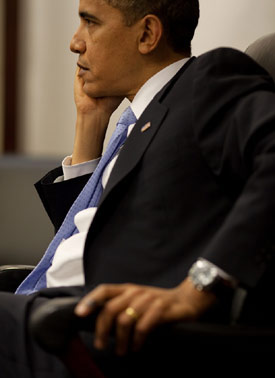
Photo: White House (Pete Souza) |
Political leaders, whatever their personal piety may be, find this realism harder to achieve. Americans are idealists. Usually they are less realistic than their leaders and more likely to encourage overreaching than to restrain it. President Obama seems to have maintained a resolute realism during his first year in office. The question is whether he can communicate it to people who elected him for the audacity of hope.
Liberals are generally less realistic than conservatives in domestic politics. They put more stock in well-devised plans, and they are more confident of their ability to coalesce general dissatisfaction with the present situation into support for a specific policy. President Obama’s strategy for health care reform has thus been remarkable for its realistic self-restraint. He has been willing to let the plan take a form crafted by compromise, and he has the patience to see reform as the work of decades, rather than a single legislative session. A similar realism seems to guide his approach to the environment and energy. The victories have been limited, the compromises have been numerous, and those who hoped for greater justice in health care and a more sustainable environmental policy have been the most disappointed. But a realist knows there is no perfect plan and will settle for modest gains that open the way to further negotiations and future improvements.
The most impressive achievements of liberal realism have been in foreign policy. The Marshall Plan, Truman’s response to the Berlin blockade, and Kennedy’s handling of the Cuban missile crisis established a pattern of forcefulness, restraint, and, above all, patience that kept the Cold War on a trajectory that left the United States the dominant global power without requiring the defeat of the enemy or igniting a nuclear holocaust. President Obama’s commitment to that legacy is apparent in his Nobel Peace Prize acceptance speech, which summarized the key points of realistic world politics: In a world where we must assume the persistence of evil, peace and justice sometimes require the deployment of force. The leaders who make those decisions must be accountable not only to their own convictions, but to the historic standards of just war and the requirements of international law.
What President Obama also warned us is that we do not yet know what this legacy of successful realism means in a post-Cold War world where the greatest threat to security is international terrorism and humanitarian crises are sparked by regimes whose nationalist or religious aims know no realistic political limits. Must we question our own righteousness so much that we let genocide continue unchecked? Does restraint require us to respect the sovereignty of countries that become havens for terrorists? The realistic balance between strategic interests and international law and the fine line that separates forceful diplomacy from the diplomatic use of force have not yet been established for these new realities.
What we can expect, if our leaders continue to be realistic, is an extended period of testing, a time in which we will have to deal with the aftermath of our mistakes as well as engage in a rigorous evaluation of apparent successes. A troop surge may be a realistic answer to insurgency that builds support for a friendly government in Kabul. Or it may not be. Either way, we will have to deal with the outcomes of today’s policy while figuring out a realistic response to the unprecedented situations that will follow when we leave Iraq and Afghanistan. Over time, if we are both skillful and lucky, this will evolve into a new kind of realism that will enable us to maintain our interests with integrity until the war on terrorism changes into some other kind of threat, just as the Cold War did. We may want a more decisive victory or a more definitive justice, but a wise leader will not expect more than that, nor promise it.
The question, then, is whether President Obama’s realistic leadership can survive the impatient American idealism that brought him into office. So far, his realist credentials seem secure, in both domestic and foreign policy. But if the people are not as patient and self-critical as he is, they will start to hope for someone who will lead them into the future with more certainty and less consultation. A religious realism about political life suggests that is one hope we should be audacious enough to resist.
Robin W. Lovin is the Cary M. Maguire University Professor of Ethics at Southern Methodist University.


